.
보리스 존슨 (영국 보수당) 선거 승리
브렉시트 가속화
Election results 2019: Boris Johnson hails 'new dawn' after historic victory
Boris Johnson has promised to deliver Brexit and repay the trust of voters after he led the Conservatives to an "historic" general election win.
The prime minister - who is meeting the Queen to ask to form a new government - has a Commons majority of 78, with one seat still to declare.
He said he would work "flat out" and lead a "people's government".
Jeremy Corbyn said he would not fight another election as Labour leader, amid recriminations over the party's defeat.
The opposition was swept aside by the Conservatives in its traditional heartlands in the Midlands and north-eastern England and lost six seats in Wales.
With just one constituency - the Cornish seat of St Ives - left to declare, the Conservatives have 364 MPs, Labour 203, the SNP 48, Liberal Democrats 11 and the DUP eight.
Sinn Fein has seven MPs, Plaid Cymru four and the SDLP has two. The Green Party and Alliance Party have one each.
The Brexit Party - which triumphed in the summer's European Parliament elections - failed to win any Westminster seats.
The Conservative Party's Commons majority is its largest since Margaret Thatcher won a third term in 1987.
- LIVE: Updates and reaction as results come in
- Sir John Curtice: What's behind the Conservative victory?
- Corbyn: I will not lead Labour at next election
- Lib Dem leader Jo Swinson to step down
- Pound and shares surge on election result
In his victory speech, Mr Johnson told activists it was a "new dawn" for the country, echoing comments Labour's Tony Blair made when he won the general election of 1997.
He thanked Labour voters, many of whom, he said, had backed the Conservatives for the first time, vowing to lead a "people's government" and fulfil the "sacred trust" placed in him.
"You may intend to return to Labour next time round, and if that is the case, I am humbled that you have put your trust in me, and I will never take your support for granted," he said.
"I will make it my mission to work night and day, flat out to prove that you were right in voting for me this time, and to earn your support in the future."
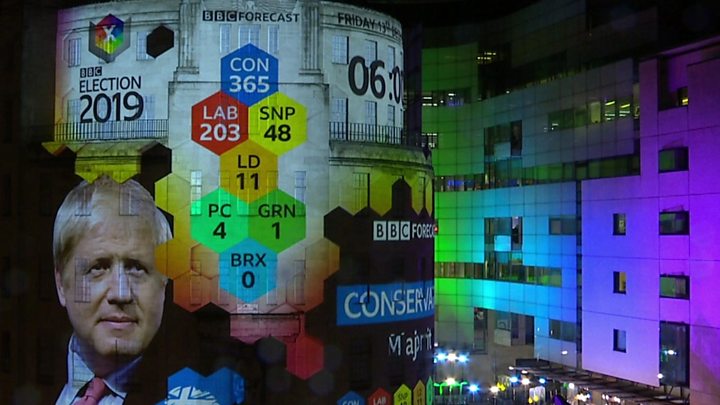
Mr Johnson said the electorate's "voice" had "been heard", adding: "The people want change... We cannot and we must not let them down."
Labour has suffered its worst defeat since 1935, losing seats across northern England, the Midlands and Wales in areas which backed Brexit in the 2016 referendum.
And Jo Swinson has quit as Liberal Democrat leader after losing her Dunbartonshire East seat to the SNP by 149 votes

- WHO WON IN MY CONSTITUENCY? Check your result
- NATIONAL PICTURE: The result in full
- ALL YOU NEED TO KNOW: The night's key points
- MAPS AND CHARTS: The election in graphics
- BREXIT: What happens now?
- IN PICTURES: Binface, a baby and Boris Johnson

Mr Johnson said the Tories' thumping victory had "smashed the roadblock" in Parliament over Brexit and put an end to the "miserable threats" of another referendum on Europe.
He said: "We will get Brexit done on time by 31 January - no ifs, no buts, not maybe."
Speaking after he was re-elected as MP for Uxbridge and South Ruislip, he said there had been a "political earthquake".
During the six-week campaign, Mr Johnson - who became prime minister in July after a Tory leadership contest - focused relentlessly on a single message, to "get Brexit done".
Labour primarily campaigned on a promise to end austerity by increasing spending on public services.


Johnson's gamble pays off
The same prime minister. But a new map.
A victory bigger than the Tories, haunted by 2017, had dreamt of. As the hours ticked by, red flipped to blue, familiar faces forced out of their seats.
Boris Johnson gambled that he could win an election with support from towns and communities where voting Conservative might almost have seemed a sin.
And he won.
The Conservatives' majority will have an almost immediate effect on the country - unless something strange happens we will leave the European Union next month because behind him on the green benches will be new Tory MPs who will vote through his Brexit bill, his position strong enough to subdue any opposition.

At 33%, the party's share of the vote is down around eight points on the 2017 general election and is lower than that achieved by Neil Kinnock in 1992.
Some traditional Labour constituencies, such as Darlington, Sedgefield and Workington, in the north of England, will have a Conservative MP for the first time in decades - or in the case of Bishop Auckland and Blyth Valley - for the first time since the seat was created.
Speaking at his election count in Islington North, where he was re-elected with a reduced majority, Mr Corbyn said Labour had put forward a "manifesto of hope" but "Brexit has so polarised debate it has overridden so much of normal political debate".
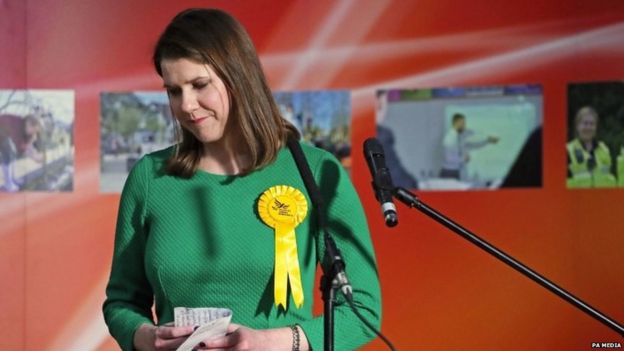 PA MEDIA
PA MEDIAThe BBC's Iain Watson said he understood Mr Corbyn wanted to stay on for a "few more months" but he could face "sustained pressure" to go sooner, given the scale of the defeat.
Former Labour MP John Mann said the leader's unpopularity on the doorstep was palpable and Mr Corbyn should have "gone already".
Others have blamed the party's support for another Brexit referendum and the long-running anti-Semitism row. Margaret Hodge, MP for Barking, said Labour had become the "nasty party".
Labour chairman Ian Lavery said he was "desperately disappointed", adding that voters in Labour's "heartlands" were "aggrieved" at the party's Brexit stance.
In other developments:
- Sir Ed Davey and Lib Dem president Sal Brinton are taking over as interim leaders of the Lib Dems
- The Lib Dems took Richmond Park, in south-west London, from Conservative minister Zac Goldsmith, but high-profile former Tory and Labour recruits Chuka Umunna, Luciana Berger and Sam Gyimah all fell short
- Nigel Dodds, the leader of the Democratic Unionist Party at Westminster, lost his Belfast North seat to Sinn Fein
- Labour's Caroline Flint - who backed the Tory Brexit deal in defiance of her party - and the party's longest-serving MP, Dennis Skinner, were among high-profile opposition figures to be defeated
- Remain-backing former Tory minister Dominic Grieve came second to the Conservative candidate in Beaconsfield
- Anna Soubry, who quit the Tories to form a pro-Remain group of MPs, lost her Nottinghamshire seat to the Tories, as did the other members of The Independent Group for Change
- Nigel Farage said his Brexit Party had taken votes from Labour in Tory target seats, although he himself had spoiled his ballot paper "as I could not bring myself to vote Conservative".
Scottish National Party leader and Scotland's First Minister Nicola Sturgeon said it had been an "exceptional night" for her party.
She said Scotland had sent a "very clear message" that it did not want a Boris Johnson Conservative government and the prime minister did not have a mandate to take Scotland out of the EU.
It was also a "strong endorsement" for Scotland having a choice over its own future in an another independence referendum, she added.
Mr Johnson has been congratulated on his "great win" by US President Donald Trump and the EU's top official, Charles Michel, who said he hoped Parliament would approve the Brexit withdrawal treaty agreed in October as "soon as possible".
The legislation paving the way for Brexit on 31 January is due to come before the new Parliament for the first time next Friday.
There is expected to be a minor cabinet reshuffle on Monday, to fill vacant positions such as Welsh and culture secretaries.
A more thorough reshaping is likely to be put on hold until February, after the UK has left the EU, with a Budget statement in March.
General Election 2019: What's behind the Conservative victory?
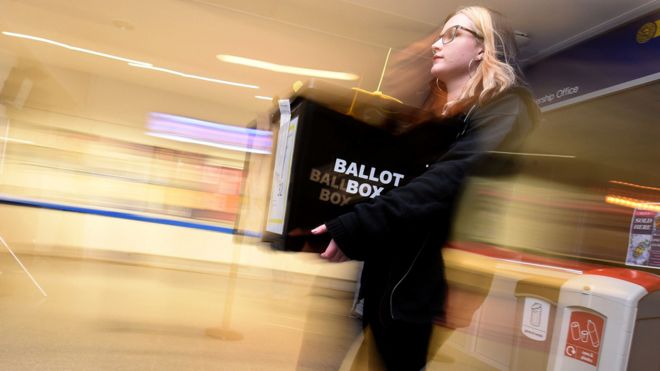 GETTY IMAGES
GETTY IMAGESBoris Johnson has won a decisive majority, on the back of a big swing from Labour to the Conservatives in Leave-voting Britain.
Yet north of the border the SNP dramatically almost swept the board.
With almost all results now declared, the prime minister is set to win a majority of 78 seats - the biggest Tory majority since 1987.
Meanwhile, at 44%, the party's share of the vote is set to be at its highest since 1979, when Margaret Thatcher became prime minister.
Labour, in contrast, finds itself with little more than 200 seats, even fewer than the party won in its previous worst post-war result in 1983.
The difference between Leave and Remain seats
However, the swing in the Tories' favour varied dramatically across the country.
In those seats where more than 60% of voters backed Leave in the 2016 EU referendum, the increase in Conservative support on average was 6%.
However, in those seats where more than 60% voted Remain, the party's vote actually fell by three points.
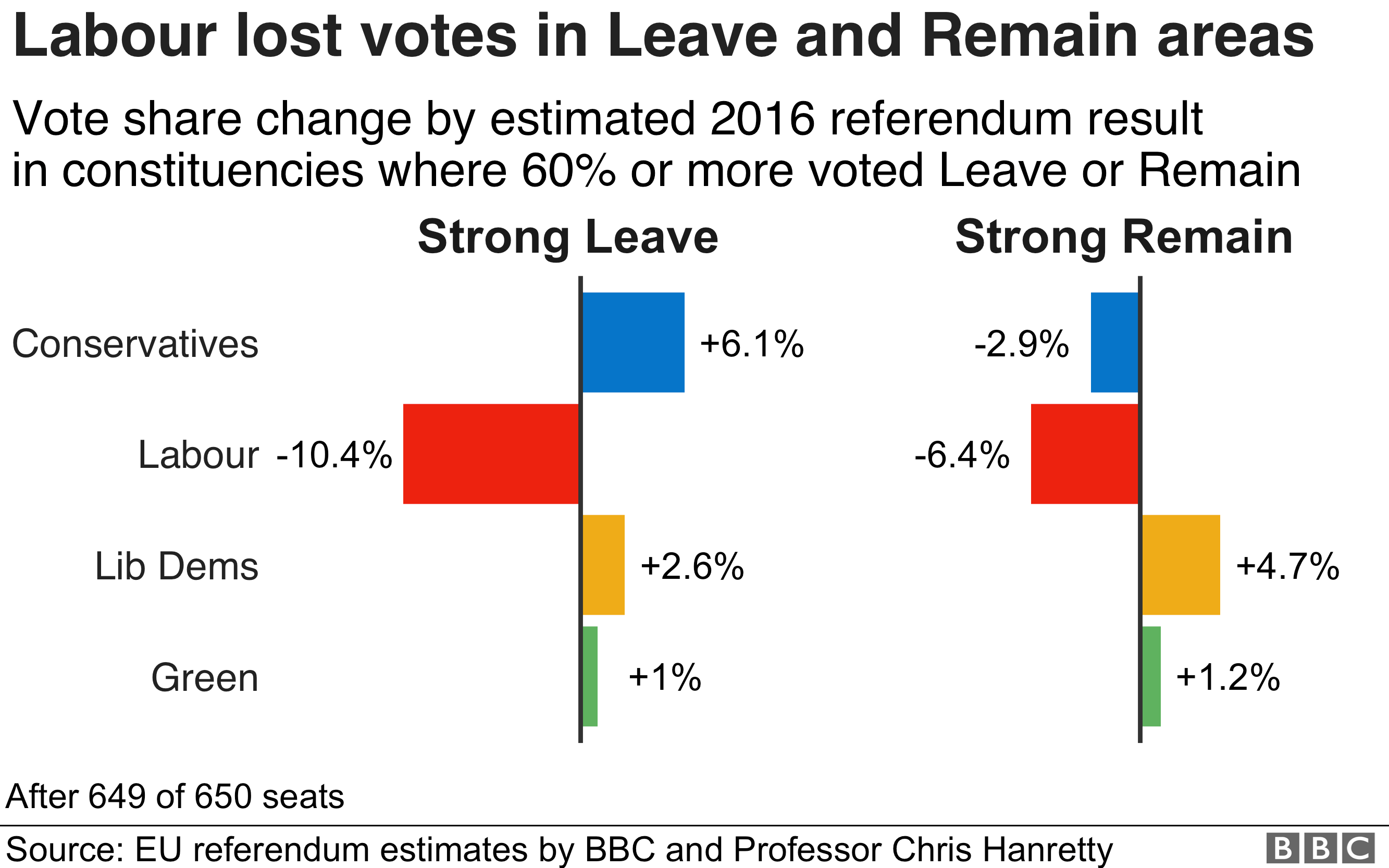
In contrast, Labour's vote fell on average by more than 10 points in the most pro-Leave areas.
Its vote fell by more than six points in the most pro-Remain ones.
Working-class and middle-class voters
This pattern had a clear impact on the geography of the election.
Support for the Conservatives rose by four points in the Midlands, the North East and Yorkshire - the regions of England that voted most heavily in favour of Leave.
In contrast, the party's vote fell back by a point in London and the South East.
And in Scotland, the party's vote fell by as much as four points.
Conversely, Labour saw its vote fall by 12 to 13 points in the North East and Yorkshire, while it fell by only six or seven points in London and the South of England.
The result also saw Labour lose ground heavily in its traditional working-class heartlands.
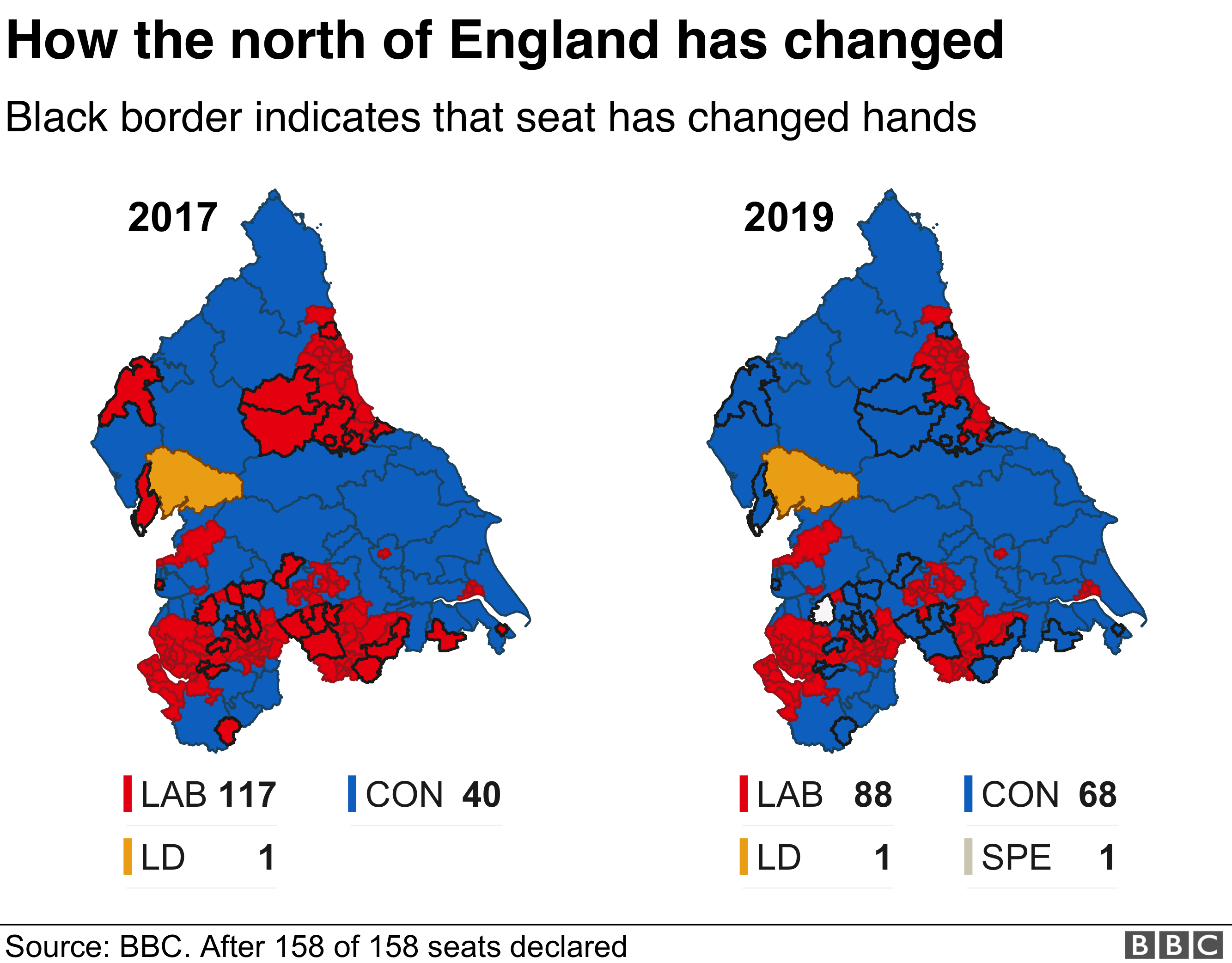
Support for the party fell by 11 points in those constituencies with most voters in working-class jobs.
Its share of the vote fell by only seven points in those with most middle-class voters.
The bond between Labour and its traditional working-class base is now badly strained.
In the EU referendum working-class voters voted heavily to leave the EU. These voters had already swung quite strongly to the Conservatives in 2017.
Labour tried to retain their support - remaining ambiguous about whether it was a pro-Remain or a pro-Leave party.
But this election simply saw the pro-Conservative trend continue yet further.
As a result, Labour dramatically lost many a seat in the North of England and the Midlands - places such as Ashfield, Bishop Auckland, and Workington - that had never previously elected a Conservative MP in a general election.
An emboldened SNP
The success of the Conservatives in England and Wales was matched by that of the SNP in Scotland.
The party has won 48 of the 59 seats north of the border, and 45% of the vote across Scotland as a whole.
It is a result almost as good as the party's historic performance in the 2015 election.


And, in a country that voted in favour of Remain, it is likely to embolden the SNP in its pursuit of a second independence referendum.
That is a ballot to which the Conservatives are strongly opposed. So, a constitutional clash between the Scottish and UK governments seems likely.
Liberal Democrat losses
One of the SNP's biggest scalps was the Dunbartonshire East seat of Liberal Democrat leader Jo Swinson - a defeat that capped a miserable night for the Liberal Democrats.
Despite advancing more strongly in pro-Remain areas, the party seems likely to end up with only 11 or 12 seats.
This will be no more than the number they won in 2017, even though their share of the vote is up by four points.
None of the many MPs who defected to the party during the last Parliament have been able to retain their seats.

- Five things to watch for in the election
- Is Brexit the most important issue for voters?
- Do people still vote according to class?
- The issues voters care about most

Fewer than half backed Brexit parties
The announcement of the election was greeted with concern about the level of turnout, for a ballot held just a fortnight before Christmas.
In the event, about 67% of voters made it to the polls - just two points down on 2017.
Turnout fell most markedly in seats where Labour are relatively strong, suggesting that some of those who usually support the party opted to stay at home.
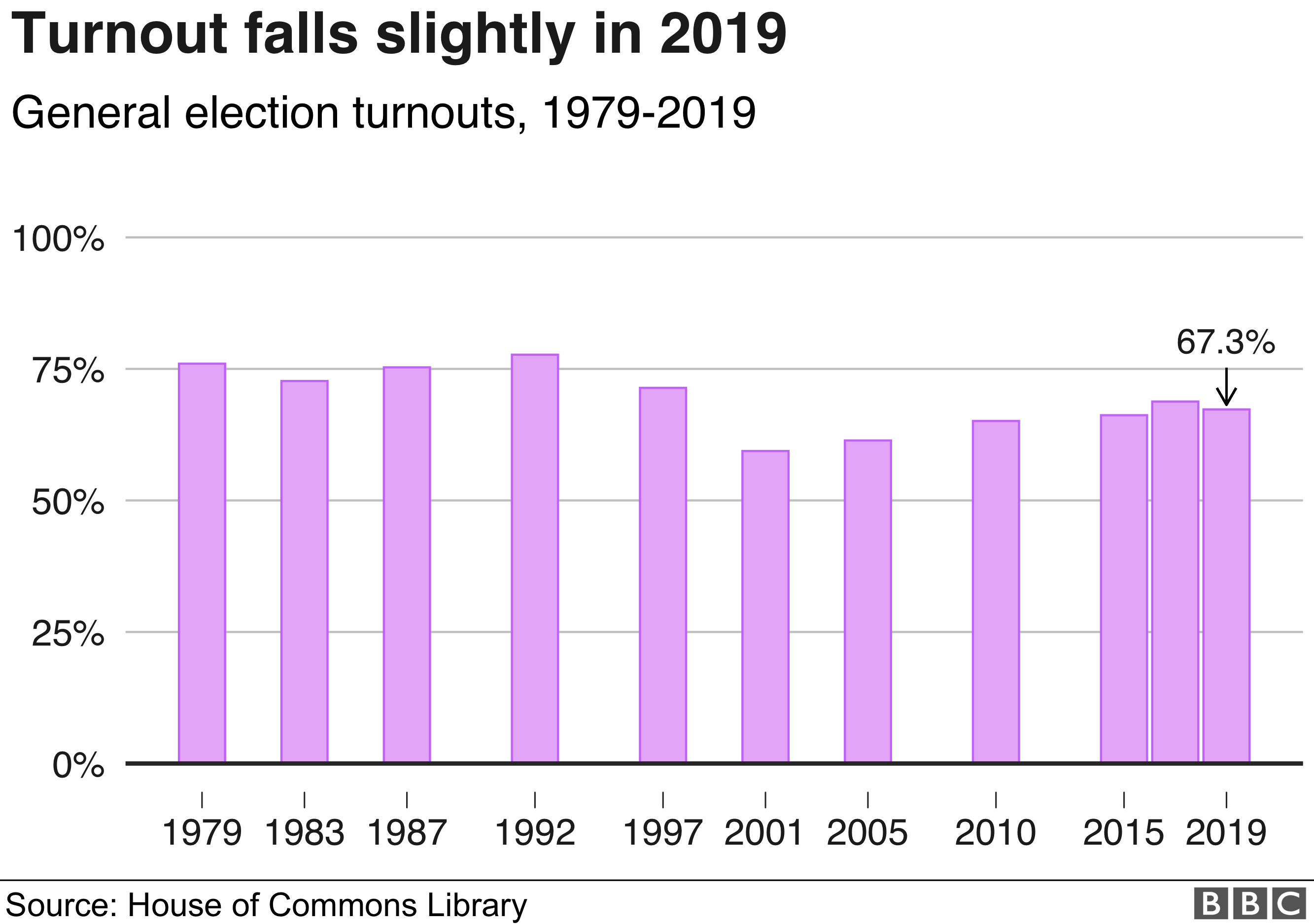
The Conservatives' success means that Britain will now leave the EU at the end of January.
However, it seems unlikely to end the debate about Britain's relationship with the EU.
The country's divisions over Brexit were exposed in the very different swings across the country.
Meanwhile, at 47%, fewer than half of voters backed the Conservatives or the Brexit Party - the parties in favour of leaving the EU without another referendum.
This is a point to which opponents of Brexit are likely to point in the weeks and months to come.
But for now at least, the day clearly belongs to Mr Johnson.
'정책비교 > 국제정치' 카테고리의 다른 글
| 호르무즈 파병 명분도 실리도 없다 (0) | 2020.01.24 |
|---|---|
| 중국 '한 자녀정책'으로 아들 선호, 6천만 여성부족으로, 신부 몸값 치솟아, 아들이 '짐'이 되다 (1) | 2020.01.05 |
| 만삭의 위안부, 故 박영심 할머니, China, 1944 (0) | 2019.12.26 |
| 지소미아 결정 뒤집은 것은 미국 스틸웰 미 국무부 차관보 - 한일 압박 (0) | 2019.11.23 |
| 제레미 코빈, 60초 영국노동당 정책 설명,Jeremy Corbyn (0) | 2019.11.22 |
| 미국 대통령 선거 방식, 각 주별로 선거인단 electoral college, 538개 중 과반인 270개를 확보해야 당선됨. (0) | 2019.11.07 |
| 2019년 노벨 평화상, 에티오피아 아비 아메드 수상에게 돌아가, 트럼프 김정은 탈락 (0) | 2019.10.11 |








